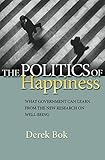The Politics of Happiness : What Government Can Learn from the New Research on Well-Being / Derek Bok.
Material type: TextPublisher: Princeton, NJ : Princeton University Press, [2010]Copyright date: ©2010Edition: Course BookDescription: 1 online resource (272 p.) : 6 tablesContent type:
TextPublisher: Princeton, NJ : Princeton University Press, [2010]Copyright date: ©2010Edition: Course BookDescription: 1 online resource (272 p.) : 6 tablesContent type: - 9780691152561
- 9781400832194
- HN60.B63 2011
- online - DeGruyter
- Issued also in print.
| Item type | Current library | Call number | URL | Status | Notes | Barcode | |
|---|---|---|---|---|---|---|---|
 eBook
eBook
|
Biblioteca "Angelicum" Pont. Univ. S.Tommaso d'Aquino Nuvola online | online - DeGruyter (Browse shelf(Opens below)) | Online access | Not for loan (Accesso limitato) | Accesso per gli utenti autorizzati / Access for authorized users | (dgr)9781400832194 |
Browsing Biblioteca "Angelicum" Pont. Univ. S.Tommaso d'Aquino shelves, Shelving location: Nuvola online Close shelf browser (Hides shelf browser)

|

|

|

|

|

|

|
||
| online - DeGruyter International Trade with Equilibrium Unemployment / | online - DeGruyter Our Army : Soldiers, Politics, and American Civil-Military Relations / | online - DeGruyter War Stories : The Causes and Consequences of Public Views of War / | online - DeGruyter The Politics of Happiness : What Government Can Learn from the New Research on Well-Being / | online - DeGruyter Eratosthenes' Geography / | online - DeGruyter Untying the Knot : Marriage, the State, and the Case for Their Divorce / | online - DeGruyter Innovation, Intellectual Property, and Economic Growth / |
Frontmatter -- CONTENTS -- ACKNOWLEDGMENTS -- INTRODUCTION -- 1. What Investigators Have Discovered -- 2. The Reliability of Research on Happiness -- 3. Should Policy-Makers Use Happiness Research? -- 4. The Question of Growth -- 5. What to Do about Inequality -- 6. The Threat of Financial Hardship -- 7. Relieving Suffering -- 8. Marriages and Families -- 9. Education -- 10. The Quality of Government -- 11. The Significance of Happiness Research -- Notes -- Index
restricted access online access with authorization star
http://purl.org/coar/access_right/c_16ec
During the past forty years, thousands of studies have been carried out on the subject of happiness. Some have explored the levels of happiness or dissatisfaction associated with typical daily activities, such as working, seeing friends, or doing household chores. Others have tried to determine the extent to which income, family, religion, and other factors are associated with the satisfaction people feel about their lives. The Gallup organization has begun conducting global surveys of happiness, and several countries are considering publishing periodic reports on the growth or decline of happiness among their people. One nation, tiny Bhutan, has actually made "Gross National Happiness" the central aim of its domestic policy. How might happiness research affect government policy in the United States--and beyond? In The Politics of Happiness, former Harvard president Derek Bok examines how governments could use the rapidly growing research data on what makes people happy--in a variety of policy areas to increase well-being and improve the quality of life for all their citizens. Bok first describes the principal findings of happiness researchers. He considers how reliable the results appear to be and whether they deserve to be taken into account in devising government policies. Recognizing both the strengths and weaknesses of happiness research, Bok looks at the policy implications for economic growth, equality, retirement, unemployment, health care, mental health, family programs, education, and government quality, among other subjects. Timely and incisive, The Politics of Happiness sheds new light on what makes people happy and how government policy could foster greater satisfaction for all.
Issued also in print.
Mode of access: Internet via World Wide Web.
In English.
Description based on online resource; title from PDF title page (publisher's Web site, viewed 29. Jul 2021)


